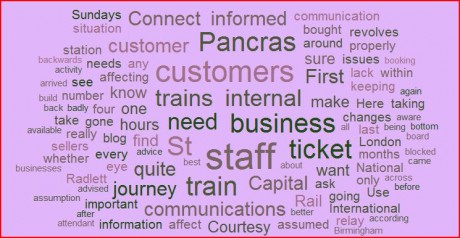Why an internal communications strategy is so important for your business
8 July 2013 By Northern Lights

 I am in dispute. Rail company First Capital Connect and I aren’t quite seeing eye to eye at the moment. There have been a flurry of emails hurtling backwards and forwards and still we seem to be at cross-purposes!
I am in dispute. Rail company First Capital Connect and I aren’t quite seeing eye to eye at the moment. There have been a flurry of emails hurtling backwards and forwards and still we seem to be at cross-purposes!
And the reason for this hive of activity revolves around the lack of communication regarding a recent train journey I had the unfortunate ‘pleasure’ of experiencing. It came on the return leg of a weekend where I spent quite a large number of hours sitting on trains run by a host of companies including East Coast, London Midland and Virgin Trains.
I thought things couldn’t get much worse after the journey from Birmingham to London where every toilet on board was blocked – quite an inconvenience when the journey is 2hrs 40mins and you are travelling with an 11-year-old.
But they did and my complaint revolves around being sold a ticket 24 hours before my journey only to find that the train I was planning to catch was not heading to where I needed to be – something I didn’t discover until the train arrived on the platform. No-where in the station were there any signs stating that trains on that day would not be running to St Pancras.
 But according to First Capital Connect, staff in the national rail booking office at St Pancras International where I bought my ticket 24 hours earlier, are “unlikely to have known that I required timetable or ticket information and “if a customer does not ask for advice, it is assumed they do not need it.” I just assumed that when I bought my ticket to travel from Radlett to St Pancras, the train I would be taking would at least take me there. Quite plainly a silly assumption on my part!
But according to First Capital Connect, staff in the national rail booking office at St Pancras International where I bought my ticket 24 hours earlier, are “unlikely to have known that I required timetable or ticket information and “if a customer does not ask for advice, it is assumed they do not need it.” I just assumed that when I bought my ticket to travel from Radlett to St Pancras, the train I would be taking would at least take me there. Quite plainly a silly assumption on my part!
Once the train had departed, without me, I questioned the issue with the station attendant who advised that there had been no trains into St Pancras on Sundays for the last four months due to engineering works.
So of course I have gone back to First Capital Connect to ask how it is possible that the National Rail ticket sellers at St Pancras International are not aware of the lack of trains from Radlett to St Pancras on Sundays considering this has been taking place for the last four months. Their response – well, there hasn’t really been a satisfactory one and despite my suggestions that their ticket sellers should be better informed, I think it has fallen on deaf ears.
Clearly, here is a situation where communication has gone very badly wrong (see our blog in internal communications) – not only have key staff members not been informed of issues affecting the tickets they sell but also the poor, lowly customer has suffered as a consequence.
In the Passenger Focus survey of 2012/2013, First Capital Connect were one of the lowest-scoring operators for overall satisfaction and I suspect if they don’t take steps to improve, they will be near the bottom again next year.
 So what lessons can businesses learn from this situation? Here I share with you my top tips for keeping your staff in the know and your customers happy.
So what lessons can businesses learn from this situation? Here I share with you my top tips for keeping your staff in the know and your customers happy.
1. Ensure staff are trained properly
It is really important to train your staff in customer care. They need to know why they are doing their particular job and how it will affect your customers if they don’t do it properly. Remember, everyone in your business needs to work together to meet customer needs.
2. Get the message across
If there are any changes going on within your business that will affect your customers, make sure your staff know for they are the ones in front line and need to portray an efficient, professional image at all times. (see our blog on integrated internal communications)
3. Make sure you tell your staff what you want them to do
Try and be specific when telling them what you want from them and make sure it is within their capabilities.
4. Choose how you communicate with them
Find the best way of keeping your staff informed, whether it be about internal issues or those affecting customers. There are a number of channels you can use to relay information but you need to decide which one is the most effective whether it be via email, a newsletter or at staff meetings.
5. Talk to your Customers
Use every channel available to keep your customers informed. As a business you need to be pro-active – it’s not the customer’s responsibility to find out what is going on but yours as a business, particularly if you want to build up trust.
How has internal communications improved your business? How would you relay changes to your customers?
